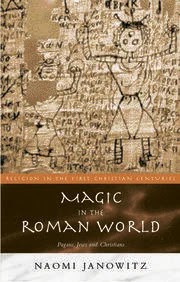The book focuses on how magic was viewed in the first Christian centuries. It has 6 chapters in addition to an introduction and conclusion. They are: 1) Greco-Roman, Christian and Jewish concepts of “magic”, w) Daimons and angels and the world of exorcism, 3) Ancient rites for gaining livers, 4) Using natural forces for divine goals: Maria the Jewess and early alchemy, 5) Divine power, human hands: becoming gods in the first century, 6) “Even the decent women practice witchcraft”: magic and gender in late antiquity.
It’s a relatively short book that gives a good introduction to the topic. The author emphasizes several times how modern definitions of the word ‘magic’ don’t match those of the past, and that we therefore have to be careful both with how we approach the topic and - if reading works in translation - how the translators may have taken innocuous words and forced a negative view on them (for example some Greek words in themselves have no magical connotations, but some translators have added the word ‘magic’ to them). Similarly, sometimes later writers objected to earlier forms of practicing their own religion, as with some people who edited the Hebrew Bible, and wrote in condemnations of what had been normal Jewish religious practices.
There are some interesting ideas here. The religious rituals of those who practiced differently were often termed magic. This could have political and therefore propagandistic purposes. The term magic comes from the Persian word ‘magos’, meaning priest. The Persians were the military enemies of the Greeks. Magic was considered bad because it worked, and worked via evil spirits rather than through the correct ‘god’ (that is, the deity the author of each specific source text followed). Thus, Romans and Greeks called Moses and Jesus “magicians” [this isn’t in the book but there are some fabulous Christian sarcophagi in the archaeological museum in Arles that show Jesus performing miracles using a magic wand, so it seems early Christians weren’t as horrified by that idea as modern Christians would be].
The book covers a decent range of topics including alchemy and deification of humans. It was interesting seeing some of the rationale behind the belief that Roman Emperors became gods after death and how some religious practitioners of other faiths tried to ascend and become like gods themselves.
The author does a good job of exploring the subject of each chapter from the Greco-Roman, Jewish and Christian viewpoints. Sometimes spending more time on one group than the others, but showing how complex the notions of magic and religion were in the ancient world.
There are no photos in the book which seems a shame.
If you’re interested in ancient religions and magic, this is a quick but useful jumping off point for more in depth studies.

No comments:
Post a Comment